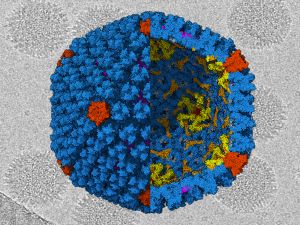Existen más de 100 tipos de adenovirus capaces de infectar a humanos y provocar enfermedades respiratorias, gastroenteritis o conjuntivitis leves. Se calcula que son responsables del 11% de las gastroenteritis infantiles en todo el mundo y, aunque en la mayoría de los casos sus efectos suelen ser leves, anualmente cerca de 54.000 niños menores de cinco años fallecen por complicaciones derivadas de estas infecciones, especialmente en el tercer mundo. Actualmente no existe tratamiento ni vacuna contra el virus.
En este estudio, liderado por el Centro Nacional de Biotecnología (CNB-CSIC), en colaboración con la Universidad Autónoma de Madrid y la Universidad de Toronto en Canadá, los investigadores han usado técnicas de crio-microscopía electrónica para comparar la estructura de la envuelta del adenovirus 41 con la de otro de tipo de adenovirus que causa enfermedades respiratorias leves (Ad5), en busca de características que expliquen su afinidad gastrointestinal.
“La envuelta proteica de los adenovirus tiene forma icosaédrica, con diferentes proteínas formando las caras y los vértices, más una serie de proteínas cemento que ayudan a formar y mantener su estructura. Al comparar ambos virus, vemos que la cápsida de Ad41 no solo es más estable en las condiciones de acidez del intestino, sino que además estas condiciones extremas favorecen su capacidad infecciosa”, explica Carmen San Martín, que dirige el proyecto en el CNB-CSIC.
La estructura obtenida muestra que en Ad41 una de las proteínas cemento tiene una organización diferente a las de todos los adenovirus estudiados previamente. “El siguiente paso será demostrar si esta diferencia está directamente ligada a la mayor estabilidad de la cápsida o a la producción de infecciones exclusivamente gastrointestinales. A largo plazo, los resultados podrían ayudar al desarrollo de herramientas terapéuticas más estables, que soporten condiciones más extremas, o el diseño de vectores virales administrados por vía oral”, añade Marta Pérez Illana, investigadora del CNB-CSIC con un contrato predoctoral de la Fundación “La Caixa”, que también participa en el proyecto.
Los adenovirus como vectores en vacunas frente al SARS-CoV-2
Los adenovirus son agentes patógenos que tienen gran potencial como herramientas terapéuticas. Su capacidad de infectar a diferentes tipos celulares y su fácil producción a gran escala los han convertido en vectores con un alto potencial terapéutico, desde el uso en terapia génica hasta la producción de vacunas. En la actualidad, varias vacunas contra el virus SARS-CoV-2, causante de la actual pandemia, utilizan vectores adenovirales para reducir o anular la capacidad de replicación del virus en el individuo vacunado, entre ellas la vacuna Oxford-AstraZeneca, ya aprobada, o las candidatas de CanSino Biologics y la de Johnson & Johnson.
Más información
Pérez-Illana, M. Martínez, GN. Condezo, M. Hernando-Pérez, C. Mangroo, M. Brown, R. Marabini, and C. San Martín. Cryo-EM structure of enteric adenovirus HAdV-F41 highlights structural variations among human adenoviruses. Science Advances. DOI: 10.1126/sciadv.abd9421.






